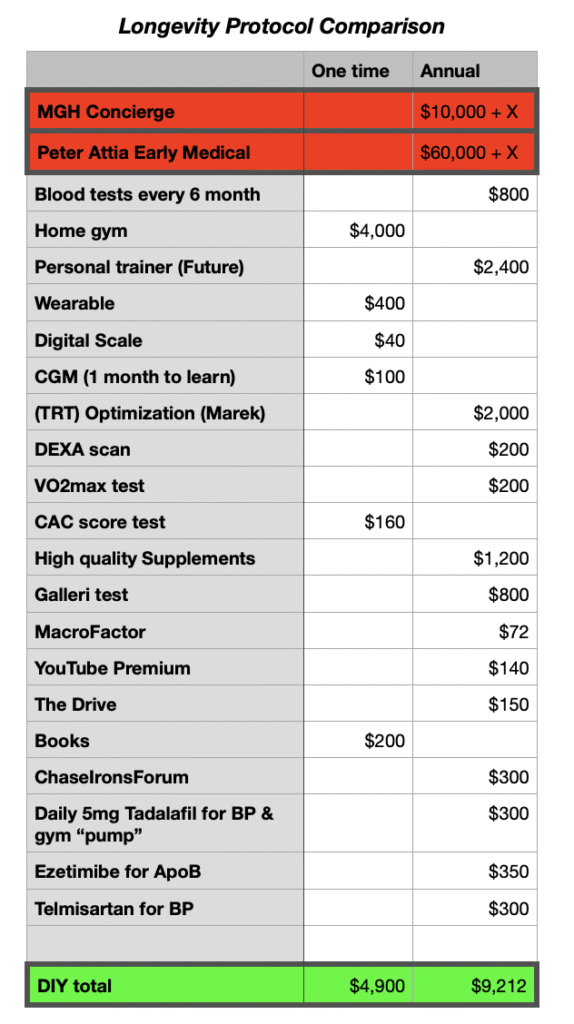Over the last year, I have been reading and watching a lot of health and fitness-related content with a focus on longevity. Peter Attia’s “Medicine 3.0” particularly resonated with me since it focuses on proactive detection and optimization of health and fitness. This is a stark contrast to the largely reactive medical approach prevalent today, where doctors only spring into action once you are sick or your bloodwork is outside the “normal range”.
I have been looking at how I can find a doctor or service that helps me with this endeavour. I looked at various online services and “concierge doctors” that promise a more individualized, personalized approach. The concierge doctors that sound promising are quite expensive, ranging from Mass General’s concierge practice ($10k/year) to Peter Attia’s Early Medical practice at $60k per year. From what I understand, you still need to carry medical insurance and pay for tests and specialized services.
I struggle to justify this cost and, as an engineer by heart, wondered whether I could use that money (say, $ 10k a year) more effectively to assemble my own protocol. Obviously, I am not a doctor, and this is not medical advice, but I hope this is a template to make the US health care system and various paid services work effectively for me. The idea is to not shy away from services and tests not covered by insurance but at the same time don’t spend $ 60k per year.
Here is my DIY Longevity plan:
- Get a decent PCP covered by insurance. Finding a PCP (never mind a good one) that actually takes new patients is surprisingly difficult and may involve a 6+month wait for your first appointment. After not having a PCP and mostly using urgent care ad hoc for years, my wife signed us up about a year and a half ago. I got lucky and really like the PCP (a nurse practitioner) a lot. She is very reasonable, responsive, and helpful.
- Collect a somewhat comprehensive family history. I am not talking about genealogy here, but make a list of your siblings, parents, and grandparents, including the age they passed away and any chronic diseases they had (e.g. diabetes, heart attacks, dementia, cancers, etc.)
- actually get annual physicals and all standard tests involved (e.g. in my health plan, apparently: A1C, PSA). I find you can often encourage your PCP to order some additional tests, e.g. lipid panels.
- Get a colonoscopy at 40 via referral from your PCP. Insurance may only cover it starting at 45, but talk to your doctor if you can find any risk factors (family history, GI bleeding, obesity, history of smoking/alcohol). If necessary, pay out of pocket.
- Pay for regular comprehensive blood tests. Most services use LabCorp or Quest for the test and possibly add some analysis (human or AI) on top. Currently, I like Discounted Labs for the best prices. I would recommend one of the “comprehensive panels” as a starting point. Make sure to add ApoB and LP(a). Surprisingly, “Body Builder panels” are often a good starting point.
- It’s critical that you get your weight in the normal range and your diet under control
- Exercise is the best tool for longevity, so make sure you commit to regular exercise (say, at least 2x strength training and 2x cardio per week). The following items are meant to make that easier.
- Join a gym *and* get dumbbells/bench/bike/Concept2 for home. For machines, I like FringSports/TitanFitness/HammerStrength, and Prime. I find the convenience of working out at home hard to beat. It removes the extra barrier of getting into the car, having to shower in a weird gym, etc. Being able to get a workout in first thing in the morning or after getting your kids to school is super convenient.
- Pay for a (online) personal trainer. This is essential. It sounds like a luxury item, but in my view, a good trainer is invaluable. Beyond workout accountability, programming, and form advice, they can be your trusted partners and adviser for all things fitness, including nutrition. I use the Future app and have been extremely happy with my trainer.
- Do “Zone 2 cardio” (aka. Just move more): 30 minute walks after lunch, ride an indoor bike, etc.
- Once a week do HIIT training, e.g. Norwegian 4×4
- Get wearable (e.g. Apple Watch or Oura ring) to track workouts and sleep
- get a digital scale and track your weight with HappyScale
- wear a CGM for a while to get a feel for your body’s response to carbs.
- pay for some supplements (multi-vitamin, omega 3, creatine, magnesium, electrolytes)
- work on sleep. Do a sleep study if necessary.
- (optional) get a sauna
- (optional) sign up for (TRT) optimization, e.g. with MarekHealth. I find Marek very good at targeting much more aggressive (tighter) ranges for blood markers in the spirit of prevention and optimization.
- pay for an annual DEXA scan. I use HumanPoweredHealth.
- pay for an annual VO2max test
- pay for a Galleri cancer test
- pay for a coronary calcium CT scan. Your PCP can order it. Insurance will likely not cover it, but it costs only about $160
- (Maybe) get a Cleerly Scan
- pay for Zepbound if appropriate and not covered by insurance
- don’t smoke or drink.
- pay for MacroFactor to track calories.
- pay for daily 5mg Tadalafil, Statin/Ezetimibe, and Telmisartan via algorx.ai if appropriate
- (maybe) pay for a whole body MRI
- read Outlive, Power of Habit, Why We Sleep, Food Intelligence, How Medicine Works and When It Doesn’t, and The Vertical Diet
- Subscribe to Petter Attia’s The Drive
- Sign up for ChaseIronsForum
- Liten/watch FoundMyFitness and VigorousSteve
- pay for ChatGPT or Claude (but be suspicious of AI hallucinations).
Personally, I have found that my PCP and trainer are actually open to input from additional bloodwork, DEXA scans, etc., even if they would not have prescribed/recommended them.
Cost analysis
If you implement the steps above you might end up at about $10k a year, which is the cost of admission for the MGH Concierge program (before any non-covered scans) and *far* below the cost of Peter Attia’s practice. If you are a billionaire, absolutely go with Dr Attia, if you are not and are eager to learn, follow this DIY Longevity Protocol. I hav priced the meds under the assumption that you need to go the Telehealth route, since your PCP might not prescribe them. With the remaining money, take your family on a nice vacation and enjoy time with them.

Current list of Supplements

